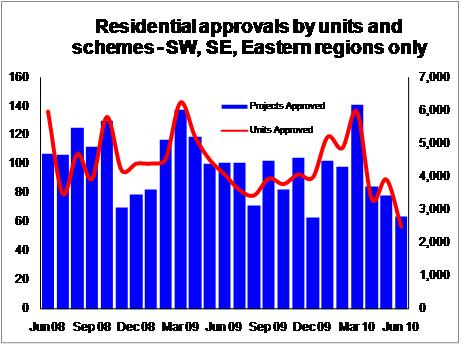Did the letter from the Communities Secretary to local authorities throw planning into a pickle?
There has been a lot of screaming about housing projects being abandoned after a letter was sent in late May from the Communities Secretary Eric Pickles to local authorities saying regional targets were, in effect, dead.
The National Housing Federation recently claimed that 85,000 planned homes have been scrapped as a result.
So as I was doing research for the forthcoming Housing Market Intelligence report analysing planning data produced by Barbour ABI, it seemed wise to see what the data suggested.
I looked month by month at projects of 10 or more homes recorded as approved by Barbour ABI and the number of homes within these projects.
Now the data only go to the end of June and you have to accept that collection and recording adds some lags to the process, which are not always even. But broadly speaking the data should provide an indication for what is happening at planning authorities.
The graph to the right reveals what I found.
It shows projects approved and units (what most people call homes) approved each month in those regions thought to read highest on the nimbyometer, that is the South East (not including London), the South West and the Eastern region.
What is most notable is the surge in applications approved in the early part of the year up to March and then a sharp fall, followed in June by a further fall to a rather desperately low level.
There are of course many interpretations you might be able to fit to this graph.
But if I had a gun put to my head and told to explain this, this is the explanation I would probably go for.
I’d suggest – obviously with the heavy caveat that there may be seasonal factors at work here – that the sharp rise might just be down to house builders and their advisers pressing hard to get consent for their schemes while the going was good.
Let’s face it, whatever the outcome of the new planning regime, things are a little uncertain to say the least, so who would want a scheme trapped in the planning process right now.
What is worth noting is that, preceding the March 2010 surge, the level of applications being submitted has been pretty feeble in historic terms, so there was not a huge amount of potential approvals in the tank so to speak.
The lull in April and May may be seasonal with bank holidays playing their part and there was that General Election.
Then there was that horror figure in June. Might this be the start of a Pickles’ inspired downturn in approvals for housing schemes? Perhaps? Probably?
In fairness I would probably suggest the same argument down the pub with a pint in my hand instead of a gun to my head – but I’d be winging it.
It is of course too early to say what it all might mean, but interesting I thought as I twiddled the knobs of my SPSS package and looked for enlightenment amidst data from half a million planning applications.
I am sure there will be those who can read this graph as definitive proof that Pickles doesn’t know his onions when it comes to the housing market and planning.
And almost certainly there will be others who would make the more extreme claim that he knows his onions perfectly well, but he is in thrall to the nimby Hufton Tuftons of Shiresville. He was to be sure rather sharpish in getting that letter out to the local authorities.
Anyway, fun though it is, that’s a debate I am out of.